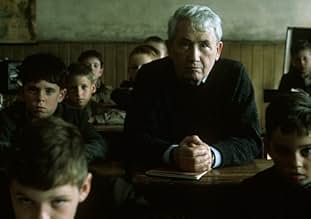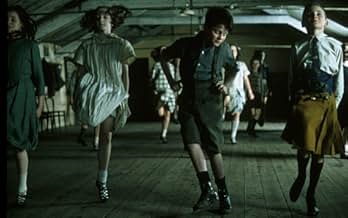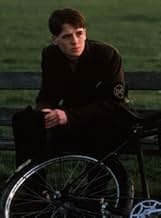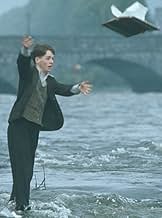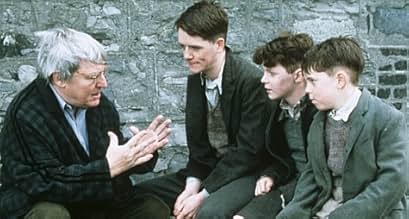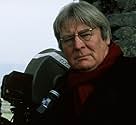Sigue las experiencias del joven Frankie y su familia mientras intentan contra viento y marea escapar de la pobreza endémica en los barrios marginales de Limerick antes de la guerra.Sigue las experiencias del joven Frankie y su familia mientras intentan contra viento y marea escapar de la pobreza endémica en los barrios marginales de Limerick antes de la guerra.Sigue las experiencias del joven Frankie y su familia mientras intentan contra viento y marea escapar de la pobreza endémica en los barrios marginales de Limerick antes de la guerra.
- Dirección
- Guión
- Reparto principal
- Nominado para 1 premio Óscar
- 5 premios y 12 nominaciones en total
- Young Malachy
- (as Shane Murray Corcoran)
Reseñas destacadas
So, the book is better - especially how he indicts the Catholic Church for keeping his family in poverty - but the movie is passable. Alan Parker has maintained a pretty good track record.
This is a very pure, almost sterile, adaptation of the original memoir "Angela's Ashes" by Frank McCourt. It chronicles vignettes in the family history of the McCourt's, a poor Irish Catholic family struggling to survive in early 20th century Ireland. The film, like the book, is stark, painful, hopeful, powerful, and deftly accurate. More than a period piece, this film works as a dramatic rendering of social history.
Unlike the book, this film depicts Frank's childhood from a disembodied third person perspective, though it is liberally complemented by an effective voice-over narrative drawn almost directly from McCourt's own prose. Frank is the oldest of several siblings (many of whom never reach adulthood), in a family suffering from poverty, alcoholism, and persecution. Although the film has many positive messages, like the lives of the McCourt's, it's not an easy road. Those who wish to be simply entertained should probably not bother.
The performances are all exquisite. Kudos to the cast and the director for making them all look so great. Visually, the film is stunning for its starkness and powerful use of contrast. The pace is a little breathless at times, but, given the richness of the original work, this is appropriate.
All considered, this is a very worthy representation of the book. The only quibble I have stems from the very act of translating what was a very intensely personal, first-person memoir into a third-person medium like film, not from anything the production team did, or from the script and cast. It would likely have been impossible in a mainstream film to depict the texture and poetics of McCourt's prose to the extent that viewers would really feel that they had grown up with him and knew him like a member of their own family. This is how the book made me feel, and seeing the movie after the book I was reminded of the feeling, but not quite so powerfully affected. I would agree that reading the book first will help you enjoy this film, however, I also believe that this stands well on its own.
I believe this is the reason this film was such a disappointment to so many viewers who had read the book. Thankfully, I saw the film first, so I had no preconceived notions. With that fresh perspective, I must say that it was outstanding.
It the story is taken from the memoirs of Frank McCourt, who recounted his childhood in Ireland in the 1930's and 1940's. It is a poignant and compelling story of a poor family struggling to survive. The images are powerful depictions of the indignity of indigence in a world where hunger and disease were common and people went almost as frequently to the cemetery as to the market.
Alan Parker brings us a starkly realistic view of McCourt's Ireland. He scoured Ireland to find a ghetto that brought forth the images described in the book, but after an exhaustive search, he decided to build the lane from scratch using McCourt's photographs. Upon visiting the set, McCourt said it was chillingly accurate and he couldn't believe he wasn't back home. Parker desaturated the color to give the film a very stark look, consistent with the squalor he was trying to portray. Paradoxically, the loss of color intensity intensified the power of the images. Though I'm not a big fan of this technique (I like rich and vibrant color), in this case it was the perfect choice.
The film suffers a bit from excessive length, undoubtedly because there was so much to cover. However, when Parker bombards the viewer with disturbingly hopeless imagery for well over two hours, it becomes tedious. This is another advantage of reading a book. You can more easily put it down and come back to it. Parker sometimes overdoes certain ideas that he could have condensed. We could have done without half a dozen vomiting scenes and all the chamber pot activity. One or two such scenes would have gotten the message across.
The cast was consistently excellent. Parker saw over 15,000 child actors before casting the three boys who played Frank at various ages. All three were wonderful, but my favorite was Michael Legge, the oldest Frank. He was the most hopeful person in the film, giving him character and determination, without losing his idealistic innocence.
Emily Watson is a great dramatic actress and rose to the occasion to endow Angela with superhuman strength, courage and persistence in the face of crushing hardship and sorrow. Robert Carlyle was also terrific as Frank's father. He made the character a lovable man with fatal flaws. Despite his heinously irresponsible behavior squandering money on drink as his family starved, his charming nature and effusive affection for the children evoked as much love from us as disgust.
This is a brilliant production. Though many who read the book were disappointed, I must point out that Frank McCourt, who wrote the book, was unabashed in praising it for its realism in capturing his impressions and feelings of the times. I rated it a 9/10. Other than a bit of overkill, this is superb filmmaking giving us an affecting look at the human face of poverty.
But reading the book provides you with a little more background- more insight as to WHY the family is in the situation it is (the mother was "knocked up" and the two were forced into marriage and family life that probably NEITHER were ready for), and especially the impact of the death of the little baby girl had- most notable in the father.
All in all, it was a great film... seriously. It's the memories a poor Irish childhood- but the best part is that much of it is told through the eyes of a 'child' (even if its in retrospect). The reason that it is unique, I think, is that if the viewer is open enough, they can get beneath the obvious misery that we're pelted with and really see the innocence of a child through out the story.
I get really irritated with those that brush it off as "been there, done that", or "Woe is me, I was a poor Irish child." I think that shows ignorance and disgusting apathy- go watch a movie where stuff explodes to keep your feeble mind occupied, because you obviously are too shallow to understand what you're seeing. Imagine yourself as that child- in a nation full of families stuck in the same rut. This isn't some Hollywood drama concocted... this is(was) someone's LIFE. And the movie sticks very much to the book- I remembered many of the exact lines word for word from the text. Also... a few people have complained about the 'incomplete' ending. That's pretty much exactly where the book ends- read (horror of HORRORS!) the sequal, 'Tis, to find out the rest.
Either way- very touching film. Definitely dark and deep, and I recommend it to anyone who has an open mind.
of Irish life.
¿Sabías que...?
- CuriosidadesInterior church scenes were shot in a Dublin studio. Because of its controversial content, the production was denied permission to shoot in any Limerick churches.
- PifiasThe Statue of Liberty has a solid, gold-plated flame, installed in 1984.
- Citas
Narrator: [First lines] When I look back on my childhood, I wonder how my brothers and I managed to survive at all. It was, of course, a miserable childhood. The happy childhood is hardly worth telling. Worse than the ordinary miserable childhood is the miserable Irish childhood. And worse still is the miserable Irish Catholic childhood.
Selecciones populares
Detalles
- Fecha de lanzamiento
- Países de origen
- Idiomas
- Títulos en diferentes países
- Angela's Ashes
- Localizaciones del rodaje
- Empresas productoras
- Ver más compañías en los créditos en IMDbPro
Taquilla
- Presupuesto
- 50.000.000 US$ (estimación)
- Recaudación en Estados Unidos y Canadá
- 13.042.112 US$
- Fin de semana de estreno en EE. UU. y Canadá
- 54.628 US$
- 26 dic 1999
- Recaudación en todo el mundo
- 13.042.112 US$
- Duración2 horas 25 minutos
- Color
- Mezcla de sonido
- Relación de aspecto
- 1.85 : 1
Contribuir a esta página




